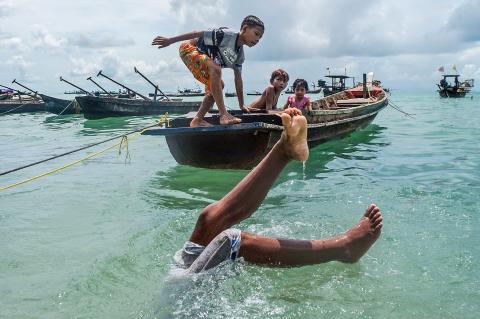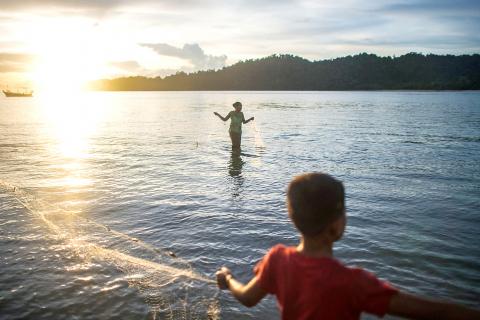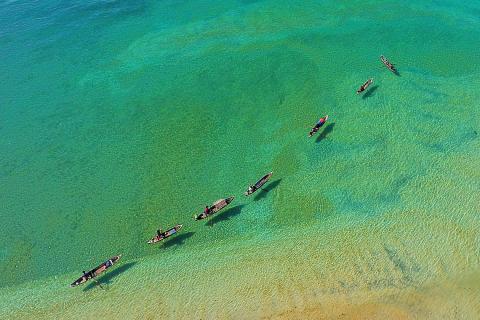With a swift breath the teenage boy dives into the turquoise waters of southern Myanmar, a spear clutched in his hand, but below him lies nothing but a graveyard of broken, grey coral.
He is one of the Moken, a nomadic seafaring tribe who have perfected this freedive fishing technique over hundreds of years among the 800 islands that dot the Myeik archipelago and neighboring southern Thailand.
Until recently the sea provided them with everything they needed: a base for boats they lived in, fish and seafood to eat and bounty such as pearls to trade with islanders for fuel and rice.

Photo: AFP/Ye Aung THU
But the waters have been devastated by the commercial fishing industry that has eaten away the area’s once abundant marine life.
The destruction has been wrought by fishing boats, many believed to be from neighboring Thailand, who use dynamite and trawlers to sweep the seabed. In a cruel chain reaction, some Moken youths have ended up working for the fishing fleets that are destroying the ecosystem that supported them through the generations.
“When we were young, a husband could easily support his family,” Kar Shar, the Moken leader in Makyone Galet village, recalled as he smoked his pipe outside his stilted, corrugated-iron house. “Now the whole family has to work to survive, and sometimes even that is not enough.”

Photo: AFP/Ye Aung THU
Many islanders, including local Karen and Burmese as well as the Moken — known as Salon in Myanmar or “Sea Gypsies” in the West — have been caught up in the trade.
Impoverished, stateless and with restricted working rights, some Moken began diving for fishing crews in the early 90s and continued after the former military government forced many to live on the islands.
“There is a lot of dynamite fishing,” said Jacques Ivanoff, an expert at France’s CNRS and the Musee de l’Homme who has spent decades working with the Moken.

Photo: AFP/Ye Aung THU
“Left alone... (they) have no other choice to make a living.”
DRUGS AN ADDED SCOURGE
It’s risky, illegal work. The fishermen travel to the deserted outer islands where they are less likely to be caught. There the divers search for the best spot, before throwing in the dynamite and quickly reversing away. Some breathe through thin plastic tubes hooked up to compressors, while others use no equipment. Many suffer decompression sickness, which can leave them crippled and unable to walk. Others die as they swim up to the surface, or never surface at all — a terrible price to pay for a business whose profits largely slip overseas. “People say the boats are from Thailand,” said 54-year-old Moken man Ko Matt.
For many the potential profits make the dangers worth it. Divers can earn more than US$100 in a night, compared to an average wage of US$3 a day on the islands.
Some Moken have turned to drugs to cope with the strain of the work.
Win Myat was a teenager when his uncle died, lost to the caffeine-laced methamphetamine pills known as yaba that have flooded the area.
“He would spend all his money on drugs,” the 20-year-old told AFP on Nyaung Wee island. “In the end he was very weak and always became angry if he did not have the pills,” he added, requesting his name be changed. “He made a lot of trouble for our family. Then he died.”
Rights activist Khin Maung Htwe estimates around 40 percent of Moken men on the islands use narcotics, either yaba or heroin from Myanmar’s drug-producing borderlands. Most are young men, leaving the Moken women to marry the local ethnic Karen and Burmese and settle further into a more land-based culture.
“Now there are not as many Moken men as women left,” said Tun Aung Soe, 20, whose mother is Moken and his father ethnic Burmese. Experts say the Moken’s population in Myanmar has fallen from around 5,000 — over 10,000 if you include other sea nomads the Moklen and Urak Lawoi — to 2,000-3,000 today.
‘BETTER ON BOATS’
The collapse of fish stocks has been a disaster for the Moken. A Norwegian fisheries research vessel which surveyed the Myeik archipelago in 1980 and again in 2013 found rampant overfishing had led to a 90 percent fall in the biomass of open ocean species of fish.
Robert Howard, marine program adviser for environmental NGO Flora & Fauna International, said there are an estimated 8,000 smaller boats and many other large trawlers operating in the area.
“If that keeps going the fishery will eventually collapse,” he warned. Many of the Moken say fishing is no longer enough to sustain them.
Today less than half of those living on the Myeik archipelago lead the seafaring life of their ancestors, and that number is declining. No one has made a kabang, the traditional wooden boat in which people used to spend most of their lives, for a decade.
Kar Shar, the Moken leader in Makyone Galet village, longs for those days again. “When we lived on the boats we could move to other places if the current place was not good, but now we cannot,” he said. “Life was better on the boats.”

June 2 to June 8 Taiwan’s woodcutters believe that if they see even one speck of red in their cooked rice, no matter how small, an accident is going to happen. Peng Chin-tian (彭錦田) swears that this has proven to be true at every stop during his decades-long career in the logging industry. Along with mining, timber harvesting was once considered the most dangerous profession in Taiwan. Not only were mishaps common during all stages of processing, it was difficult to transport the injured to get medical treatment. Many died during the arduous journey. Peng recounts some of his accidents in

“Why does Taiwan identity decline?”a group of researchers lead by University of Nevada political scientist Austin Wang (王宏恩) asked in a recent paper. After all, it is not difficult to explain the rise in Taiwanese identity after the early 1990s. But no model predicted its decline during the 2016-2018 period, they say. After testing various alternative explanations, Wang et al argue that the fall-off in Taiwanese identity during that period is related to voter hedging based on the performance of the Democratic Progressive Party (DPP). Since the DPP is perceived as the guardian of Taiwan identity, when it performs well,

A short walk beneath the dense Amazon canopy, the forest abruptly opens up. Fallen logs are rotting, the trees grow sparser and the temperature rises in places sunlight hits the ground. This is what 24 years of severe drought looks like in the world’s largest rainforest. But this patch of degraded forest, about the size of a soccer field, is a scientific experiment. Launched in 2000 by Brazilian and British scientists, Esecaflor — short for “Forest Drought Study Project” in Portuguese — set out to simulate a future in which the changing climate could deplete the Amazon of rainfall. It is

The Taiwan People’s Party (TPP) on May 18 held a rally in Taichung to mark the anniversary of President William Lai’s (賴清德) inauguration on May 20. The title of the rally could be loosely translated to “May 18 recall fraudulent goods” (518退貨ㄌㄨㄚˋ!). Unlike in English, where the terms are the same, “recall” (退貨) in this context refers to product recalls due to damaged, defective or fraudulent merchandise, not the political recalls (罷免) currently dominating the headlines. I attended the rally to determine if the impression was correct that the TPP under party Chairman Huang Kuo-Chang (黃國昌) had little of a